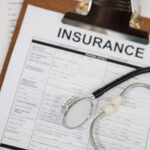Car Insurance in Nigeria: Everything Drivers Should Know

There’s a Nigerian driver saying, “when you’re on the road, think of everyone as a mad person”. It might be funny. On the road, it becomes not only about you, but other drivers too — even if you are the most careful driver.
From the reckless drivers, to pothole-ridden roads to car vandalism, and even to the full car theft itself.
Whether it’s a personal vehicle or a commercial car, having car insurance is now legally required.
Despite this, many Nigerian drivers do not have insurance , and many of those who do, do not fully understand the coverage they have. This guide is here to walk you through in less than 5 minutes. Do I have your attention?
A car insurance is a deal made between a vehicle owner and an insurer. In the case of theft or damages, the insurer steps in to pay for hefty repairs, bills or third-party claims.
In Nigeria, car insurance is compulsory with vehicle owners mandated to have at least a Third-Party Motor Insurance policy regulated by the National Insurance Commission (NAICOM).
Types of Car Insurance in Nigeria
1. Third-Party Only Insurance (TPO)
Required by the law in Nigeria and it covers:
- Injury or death of other road users.
- Damage to third-party property
- Cheapest type of insurance
- Does not cover damage to your own vehicle, theft or fire.
2. Third-Party, Fire and Theft Insurance
This type includes all the benefits of Third Party Insurance with additional coverage for:
- Theft of your vehicle
- Fire damage to your vehicle
It still doesn’t cover accidents involving your own vehicle.
3. Comprehensive Car Insurance
The highest level of protection covering
- All third-party issues
- Damage to your own car
- Theft and fire
- Some policies include personal accident cover and towing services
- Most expensive option
- Premiums vary based on vehicle value and risk profile
Why You Need Car Insurance in Nigeria
-
Driving without insurance is a punishable offense.
- Insurance cushions financial blows.
- Some policies help pay for medical bills in case of injury.
- Compensations in case of theft or vandalism.
How to Buy Car Insurance in Nigeria
Step 1: Compare Providers
Popular insurance companies include:
- AXA Mansard
- Leadway Assurance
- AIICO Insurance
- Mutual Benefits Assurance
- Custodian and Allied Insurance
N.B : Choose a trusted insurer with a good track record
Step 2: Choose a Policy Type
Step 3: Submit Required Documents
You’ll need:
- Driver’s license
- Vehicle registration papers
- Proof of car ownership
- Valid ID (e.g., NIN, passport)
Step 4: Pay Your Premium
This can be monthly, quarterly, or yearly.
Step 5: Receive Your Certificate which you must carry when driving.
What Car Insurance Typically Covers
| Coverage Area | Third-Party Only | Third-Party, Fire & Theft | Comprehensive |
| Damage to other vehicles | ✅ | ✅ | ✅ |
| Damage to your car | ❌ | ❌ | ✅ |
| Fire damage | ❌ | ✅ | ✅ |
| Theft | ❌ | ✅ | ✅ |
| Legal liabilities | ✅ | ✅ | ✅ |
| Personal accident cover | ❌ | ❌ | ✅ (in some policies) |
Exclusions to insurance payments
- Drunk driving accidents
- Using the car for commercial purposes (unless declared)
- Wear and tear
- Damage from illegal activities
- Unlicensed drivers
- Mechanical breakdowns
read the fine print before buying any policy.
To File For A Claim
Step 1: Report to the Police
Get a police report within 24 -48 hours. Step 2: Inform Your Insurance Provider
Step 3: Submit Documents
This may include:
- Police report
- Pictures of the damage or scene
- Completed claims form
- Copy of your insurance certificate
- Vehicle documents
Step 4: Wait for Inspection
Step 5: Receive Compensation
N.B: Only use NAICOM-licensed providers
How Much Does Car Insurance Cost in Nigeria?
Based on insurance type, driver’s history, private or commercial vehicle, the approximate costs are:
| Policy Type | Estimated Annual Premium |
| Third-Party Only | ₦5,000 – ₦15,000 |
| Third-Party, Fire & Theft | ₦15,000 – ₦40,000 |
| Comprehensive | 3–5% of car value |
Conclusion
Driving without insurance is risky, illegal, and costly. A few thousand naira now could save you millions later.
N.B Most insurance policies are not transferable especially after a car is sold.




















